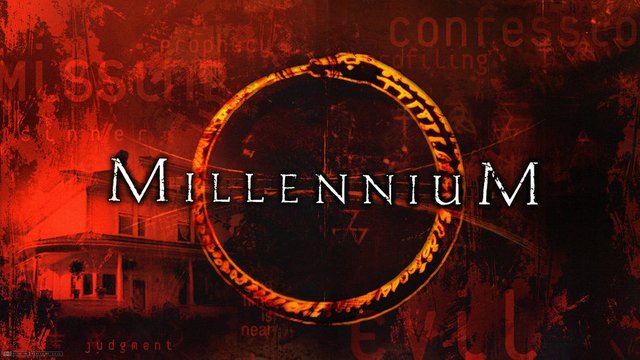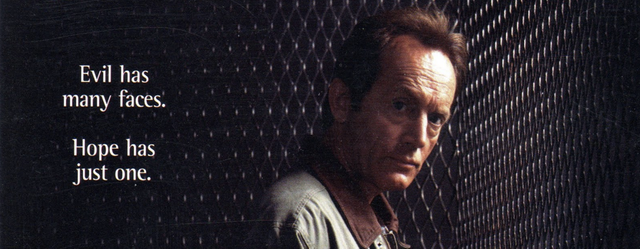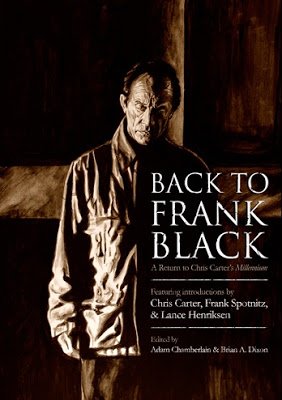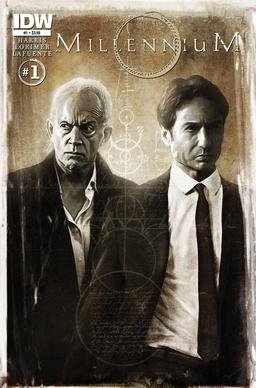Michael's TV Lase-O-Rama: Millennium (1996 - 1999, 20th Century Fox)

Source: LDDB.com
Two months ago, I asked my readers and followers what they'd enjoy seeing me write about on the platform. Long-time reader @darth-azrael noticed my complete set of Millennium laserdiscs in my collection on LDDB.com and subsequently inquired about my thoughts on the series with this comment:
I see you have Millennium laser discs. I'd be curious what you think of that series in general. While I've been meaning to watch it pretty much since it was being broadcast originally, I've never gotten around to it (except the crossover episode with The X-Files).
Well @darth-azrael, I hereby grant your wish by looking at Millennium on today's installment of "Michael's TV Lase-O-Rama"!
I've collected laserdiscs now for about fifteen years, give or take, but that makes it sound like they're something I've taken an active interest for the entirety of that period. This is not the case. My interest in the format started back in the 1980's, when I watched The Empire Strikes Back at a friend's house and realized how much better it looked and sounded than my VHS copy, but I didn't acquire my first player until the early 2000's.
I got it for the Star Wars Trilogy, which wasn't available on DVD at the time. After that, I added a nice run of films to my library over the next few years. Then tragedy struck in the form of dogs who decided, out of the blue, to turn my LD library into their mid-day snack. I didn't lose the whole collection, but I lost enough that, demoralized, I put my 'disc collection into storage.
It took Millennium to jump-start my desire to get back into the fray. I'd picked up the DVD seasons as they became available, but the laserdisc sets, which are a Japan-exclusive release made straight from the TV film masters and feature hard-coded Japanese subtitles burnt into the picture, are things of beauty. Seeing them reminded me why I fell in love with the format years ago, and I knew I had to have them. From there, the obsession renewed and the collection ballooned to what it is today.

Source: IMDB.com
Millennium was the first show Chris Carter pitched and produced as a follow-up to the monstrous cultural phenomenon The X-Files had become, and its easy to see the similarities. Both shows feature law enforcement officers pitting their talents against cases where things are not always as they seem. But while The X-Files occasionally shone its flashlight down some dark hallways, and while Mulder and Scully seemed to be fighting a never-ending uphill battle for the truth, the overriding optimism of its protagonists who still return to the job, day after day, week after week, regardless of the tragedies and travesties played out upon them by fate or their own government, remains a series staple. The guiding theme of The X-Files from episode to episode, season to season, is always 'hope'.
By contrast, the guiding theme of Millennium from its pilot episode to its early and abrupt cancellation after season three, is 'hopelessness'.
Wait -- Worry -- Who cares?
Millennium's theme was composed by Mark Snow, the same musical genius behind The X-Files, and yet the two themes sound nothing alike. The X-Files main theme brings to mind ideas of mystery and curiosity, inviting you to explore along with the protagonists the bizarre, the paranormal, and the weird.
Snow's theme for Millennium on the other hand invites you to wallow in the gutter for a little while with its minor-key strings. The X-Files theme is a friend poking his head around the corner, saying, "Hey, check this out!". It appeals to your sense of curiosity. The Millennium theme is a guy in a trench coat carrying a bloody knife, running away from a body sprawled out on the asphalt of an abandoned parking lot at 3 o'clock in the morning. It appeals only to the morbid side of your curiosity, because you know nothing good can come from your involvement.
Millennium, at its heart, is the story of Frank Black, a character with a past and a present as dark as his family name implies. If Lance Henrikson, with his scared countenance and gravelly voice, seems to fit the character of Black like a glove, that's because Carter wrote the part specifically with him in mind. The X-Files, as it turned out, could still limp around when David Duchovny, Gillian Anderson, or both, were absent--without Henrikson, there is no Millennium, and he carries the weight of the show on his shoulders for all the world like an all-too-mortal Atlas tasked not with holding up a planet, or a continent, a country, or even a state, just the rain-soaked city of Seattle, Washington, where Frank has moved along with his wife Catherine and daughter Jordan.
Frank used to be a criminal profiler with the FBI, a job he grew to detest. Not because he wasn't good at it; on the contrary, Frank was actually too good at his job, blessed, or more accurately cursed, with a gift that allowed him to not just analyze a crime scene and its victims, but to get inside their heads. Not in the metaphorical sense either. Frank can literally see what the criminal saw, feel what the criminal felt, just by being in close proximity to the evidence, the area, or the victim. Frank doesn't simply pretend to put himself in his suspect's place the way an actor pretends to put himself into the role of Macbeth, he transplants a portion of that suspect into his own psyche. The blood on the hands, the thrust of the knife, the thrill of the hunt, the pleasure of the kill, all these come home to roost in Frank's head as he works a case.
Hoping to cleanse his palette from a lifetime spent hunting society's dregs and put some distance between his family and an unknown stalker, Frank quit his job at the FBI and moved across the country, taking a job as a consultant with a team known as "The Millennium Group". Staffed with people possessing similarly unique talents, "The Millennium Group" contracts their services to law enforcement agencies and maintains a comprehensive computer database of criminal activity, with a special focus on serial killers. Frank's most common interaction with the group involves Peter Watts, played by Chris-Carter-series staple and later Lost alumnus Terry O'Quinn, and in this first season, they're more an enigma than an active force driving the plot. Much of Frank's on-screen time is spent working with Seattle PD, specifically Lt. Bletcher (Bill Smitrovich) and Det. Giebelhouse (Stephen J. Lang), who work the Homicide division and occasionally disturb Frank at home to ask for his assistance.
Much like The X-Files, the first season of Millennium operates on a 'monster-of-the-week' episodic style, where the show opens with a crime, usually a murder, with some bizarre characteristics that place it outside the expected boundaries for such an act such as missing or conflicting evidence. Frank is then brought in by Seattle PD, or shows up of his own accord, to help the police find the perpetrator and prevent further instances of violence. Later episodes begin to establish character arcs, including one where it is implied Frank's daughter Jordan may have inherited his "gift", triggering a desperation to find some way, any way, that he might turn it off and thereby spare her the horrors of reality as he's been forced to see it his entire life.

Source: PopcornMonster.com
The show is dark, and I mean that literally, not just in the psychological sense. Thick black-levels and shadows pervade virtually every scene, with much of the action taking place either after nightfall or in dark interior locations where little light can leak. This, more than anything, is why I wanted the laserdiscs in my library. As an analog video format, nothing does black levels like a laserdisc, and on a properly-calibrated television which isn't contrast-boosted to the absurd, Millennium looks absolutely gorgeous, completely devoid of compression artifacts and other telltale signs of the digitization process. Likewise the soundtrack is crystal clear and distortion-free. It's not often one can honestly claim the LD surpasses the DVD, but I'd challenge anyone to put the two side by side and defend the DVD as being higher-quality in either picture or audio.
What's especially strange to me about the Millennium release on LD is how rapidly these discs emerged in Japan, and how long it took to get the series released in any format anywhere else in the world. The show made its debut in the US in October of 1996, with the first season running through May of 1997. Season 1, Volume 1 of Millennium, which contains the first ten episodes on five discs, arrived on Japanese store shelves in October 1997. This means it had been subtitled for Japanese viewers, broadcast on Japanese television, pressed to laserdisc, packaged, and distributed in a mere five months. Subsequent volumes showed up just as fast: the third and final volume of Season 3 dropped in October of 1999, once again five months after the series finale screened in the US.
By contrast, barring watching copies taped off television, US fans had to wait until the DVDs were released in 2004, nearly five years after the show went off the air. None of my research thusfar has turned up a reason why the Japanese market received such a fast turn-around on these shows. There's nothing to indicate a stronger, larger, or more ardent fan base there than in North America or the UK, and yet they even got the DVDs earlier than we did: about a week and a half before the US in terms of the first season, four months in the case of season two, and nearly an entire year in the case of season three. Maybe Mulder and Scully can look into this case once they're done shooting the second X-Files event series?
There are three downsides to the laserdisc releases of Millennium, two of them significant, one slightly less so. The less-significant downside is that while they collect all 67 episodes comprising all three seasons, the collection isn't quite complete. It's missing 'Millennium.' I know that sounds confusing, but go with me here.
Fox cancelled Millennium in 1999, citing low viewership numbers. Unfortunately this left Chris Carter with a problem: he had four seasons' worth of story outlined for Millennium, all hinting towards an apocalyptic catastrophe due to happen in the year 2000, and had ended Season 3 on the assumption he'd have that final season to tie up all the loose ends. When that didn't happen, Carter scrambled to find some way to bring closure to Frank Black's story. The way he found was unorthodox, and didn't do much to capstone the saga of Frank and the Millennium Group, but it was all he could do considering what he had to work with.
The seventh season of The X-Files contains a crossover episode entitled 'Millennium', where Mulder and Scully track down Frank Black to enlist his aid in a case involving ritual suicide among FBI agents. While it's not the send-off for the character Carter had hoped, 'Millennium' is considered canonical to both series and is included on the Season 3 DVD release. The laserdiscs, unfortunately, were pressed before this episode aired and thus don't contain it. Given that it can be found on the DVDs for The X-Files's seventh season, which does not necessitate the re-purchase of either the third Millennium season on DVD, or the complete boxed set, this is hardly the end of the world (no pun intended).
The other two issues are much bigger deals. Let's start with the obvious: if you want to own Millennium on laserdisc, you're looking at some serious shelf real-estate. Season 1 is broken into two parts, while seasons 2 and 3 are broken into three. This means you need to acquire eight separate box sets if you want the complete collection. These things are huge and heavy, with thirty-four discs, thirty-four individual sleeves, eight separate booklets, and eight outer cases, making that Star Wars Trilogy Definitive Collection look minuscule by comparison.
And, in case it isn't obvious already, finding eight complete boxed sets of a series released twenty years ago on a now-defunct and no-longer-supported format outside its country of origin is likely going to cripple you financially. In Japan, these were clearly for enthusiasts only, as it would have set you back ¥50,000 just to get both volumes of the first season, roughly $420 US given the exchange rate of the day. While it's not quite that outrageous today, you can still expect to drop ~$80-100 per volume depending on condition. Then, unless you luck out and find a seller close enough to you that you can do an in-person pickup, international shipping for such heavy items will eat you alive even at the slowest delivery options. I only own these because I got exceptionally fortunate and received a once-in-a-lifetime deal. They are not worth re-mortgaging one's house over.
Millennium as a series is incredibly enjoyable. If you like Chris Carter's other works and you don't mind a darker, grittier, more violent and apocalyptic look at the frailties and failings of humanity, you'll dig this show and likely wish it had been allowed to reach its natural conclusion with a fourth season. The first season is phenomenally acted, written, and produced, and the overall series plays like Game of Thrones lite, in that nobody has script immunity. While it's common to see characters on some of Carter's other shows, especially The X-Files, return time and time again even after situations where they should have died dozens of times over (Alex Krycek, anyone?), Millennium has no problem turning series regulars into potato hash, physically or mentally.
Indeed, so strong is the following for Millennium that Lance Henrikson has remarked on multiple occasions that he'd love a chance to re-visit the character either in television or feature film format, Carter has repeatedly pitched a re-launch to Fox (to little avail, alas), and writers like Frank Spotnitz, Glenn Morgan, and James Wong have routinely expressed support for such a project. In 2012, thirteen years after the series went off the air, a book entitled, "Back to Frank Black: A Return to Chris Carter's Millennium" hit store shelves:

Source: WELCOMETOLEVEL
The image of the ouroboros within the series logo is especially fitting, as Millennium literally devoured itself over the course of its three seasons, sacrificing characters and stories to its hunger with seemingly little regard for what is to come next. That Fox killed it before it could finish the job is both sad and somehow uplifting, as they accomplished what Frank Black had little chance of doing by ending the conspiracy before it bore fruit. Millennium now survives as an open-ended scenario where viewers today can still wait, worry, and wonder, "Who cares?" Given the way The X-Files concluded in 2002, I can't help but think part of the reason it maintains such a cult following today is that it died before its time, and we always look back fondly on those who departed before they had the chance to complete their purpose in life. Does anyone look at the series finale of The X-Files the same way?
As if that wasn't enough, 2015 saw the release of a five-issue Millennium limited series by IDW, which once more brought Frank Black and his family back into the public's consciousness:

Source: IDW Publishing
Finally an entire suite of television programs cropped up to fill the void left by Millennium: if you ever enjoyed C.S.I., Bones, Profiler, Criminal Minds, Numb3rs, or any other show devoted to forensic anthropology and the pathology of serial offenders, unafraid to look away from the carnage, you owe a debt of gratitude to Millennium for opening the floodgates.
The X-Files will forever be the single largest franchise spawned by Chris Carter. Nothing he's gone on to create or produce since has had the impact, the resilience, or the staying power of that original foray into the paranormal. But while The X-Files may be the most successful, I think Millennium is the better product. Like Kurt Cobain it died too early, but also like Nirvana's lead singer, its echoes still rebound in our cultural consciousness, inspiring others to greater heights. Despite the intervening two decades since its departure, Millennium still feels relevant in its handling of the subject matter. It's not like the passing of Y2K put a sudden kibosh on declarations of Armageddon yet to come, and there have been plenty of disasters, natural and otherwise, since the clock rolled over.
Ultimately, Jose Chung (in a connecting appearance from his original arrival into the Carter-verse via The X-Files episode, 'Jose Chung's From Outer Space') sums it up best in the second season episode, "Jose Chung's Doomsday Defense":
I humbly add my own prophecy of what the dawn of the new millennium shall bring forth: one thousand years of the same old crap.
Eighteen years in, I see little contradiction to his prognostication. That, more than anything else, is why Millennium still resonates. We're still fighting humanity's darkest urges. There's a little of that darkness in all of us. Fortunately there's Black within most of us as well, resolutely striking a match to hold the shadows at bay, doing the best to shield our children from the evil we know exists, hoping maybe, just maybe, we can snuff it out before its tendrils snake in and mar their innocence.
If not forever, than at least for one more day.
I'm definitely going to have to check it out. Saying that it is better than the X-Files is definitely a bold claim as that's probably my all-time favorite show :). Unfortunately, Netflix doesn't have it but I see Amazon has the complete series on DVD for a little over $30. It may not match the laserdiscs in terms of quality but you can't beat the price. Doesn't look like it has made it to blu-ray...
It is a shame that they cut it short at three seasons. If it was anything like the X-Files, quality would have still been ramping up. These days there is much more opportunity for a cancelled tv series to find a 2nd life elsewhere but that just wasn't the case then. I love the X-files but they let the whole alien conspiracy storyline drag on way too long. Chris Carter obviously didn't have a plan for that for 9 seasons...or 11 for that matter. The monster of the week stories were almost always wonderful but as time went on, the alien conspiracy storyline got more and more convoluted. I always though both types of episodes were important to the formula of the X-Files but they needed a new storyline or a different angle for that aspect of it.
I do wish they had let The Lone Gunmen spinoff series go on a while longer. I loved those characters and the show wasn't bad. Chuck wasn't around then but in retrospect it kind of reminds me of a cross between Chuck and The X-Files.
@darth-azrael made an excellent choice. I've never seen the series but I listened to the opening theme and it's gorgeous! I bemoan that so few television shows are allowed proper opening themes now.
Another excellent post about something cool that I didn't know about and I get the impression in fact that it's reasonably obscure-ish (not nearly so much as your *Razor( chronology, admittedly [a post which makes me want a function to favorite posts and a tab for users to access their favorites, just so I can easily access it whenever I want to read it again], or some of your other posts) which doubly interested me.
Tangential, but I recently caught a clip of The Last Action Hero when I was looking up Charles Dance on YouTube. I can't remember if you mentioned it in your review or not, but seeing Dance in it sealed the deal. One of these days I want to see it. Dunno when, but one of these days...
I have the Laserdiscs and can attest to the sumptuous art on 12inch vinyl style sleeves. Would love to know the Japanese story behind the releases. Thanks for a terrific analysis of a seminal program.